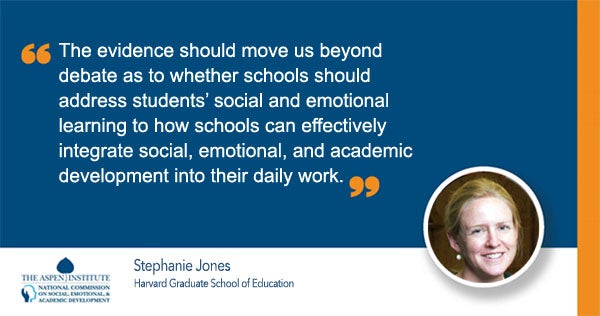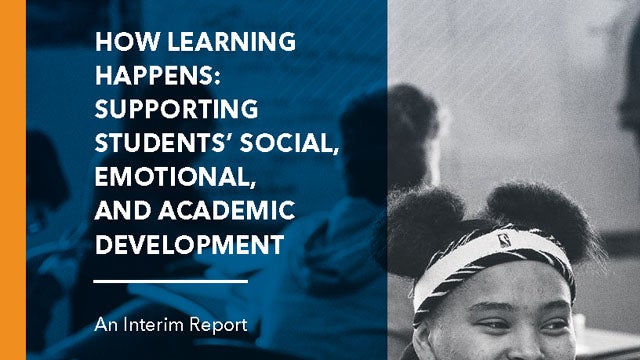Launched to “advance a new vision for what constitutes success for our schools and our students,” the Commission is drawing on insights from students, educators, youth development professionals, researchers, and civic and business leaders. Highlights of the Commission’s first year include:
- The Council of Distinguished Scientists, a 28-member alliance of leading scientists and scholars, unanimously developed and endorsed a research brief outlining the scientific evidence for how people learn. The brief draws from brain science, medicine, economics, psychology, and education research to illuminate how the major domains of human development—social, emotional, and academic—are deeply intertwined in the brain and during the learning process.

- The 34-member Council of Distinguished Educators is working to identify opportunities for the intentional integration of social, emotional, and academic development in districts, schools, and classrooms, as well as to recommend strategies for changing practice. A consensus statement on these topics will be published early this spring.
- Drawing on the educators’ input and the researchers’ consensus, the National Commission’s Policy Subcommittee has begun to identify policy opportunities to create the conditions within states, districts, and schools for supporting students’ social, emotional, and academic development. In the next stage of work, experts from research, practice, and policy will be invited to provide advice and concrete examples of how policy can both help and hinder the work of districts and schools.
- The Partners Collaborative—a coalition of more than 40 organizations representing the education, policymaking, business, health, youth development, and community and civic sectors— brings invaluable perspectives on what it takes to support students’ social, emotional, and academic development. Our partners have contributed to the Commission’s work, including our case studies, convenings, and ongoing deliberations. Moving forward, the partners will be invited to inform policy and practice discussions about social, emotional, and academic development within their sectors.
- We also have benefitted from firsthand insights and on-the-ground feedback from the Aspen Institute Youth Commission on Social, Emotional, and Academic Development. In addition to crafting narratives of their own school experiences, the youth commissioners are developing a Youth Call to Action that will identify what they know to be true about social, emotional, and academic development and will serve as a catalyst for galvanizing change in their schools and communities.
- Meanwhile, the Commission has looked to the expertise of our Parent Advisory Panel to lend perspectives on how schools and communities can best work with families to support students’ comprehensive development. As part of this, panel members have considered how educators can effectively communicate with families and community members.
- We are also working to help the field illustrate how learning happens. As part of this effort, we are producing case studies, research briefs, videos, and other content to paint a picture of what intentional social, emotional, and academic development can look like in classrooms, schools, and communities. These stories and tools will help parents and teachers, in particular, to understand and champion this approach to learning.


